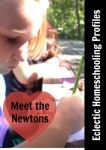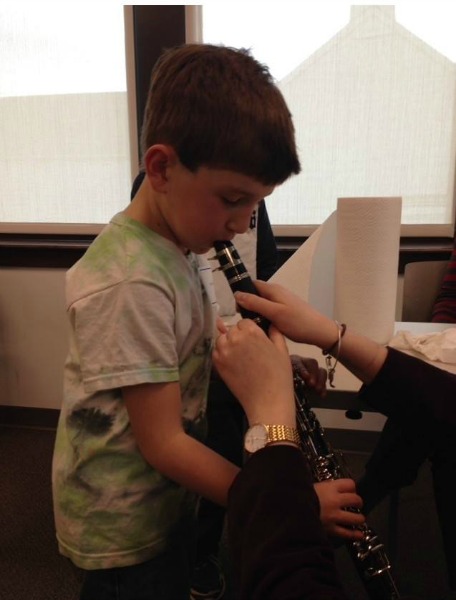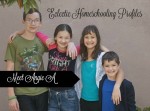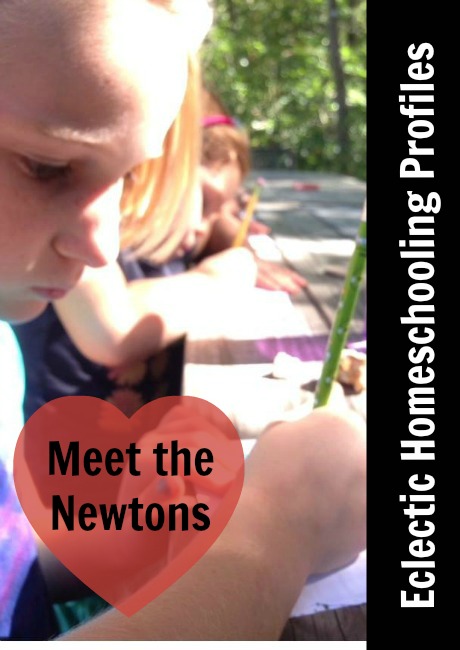
Eclectic homeschooling involves meshing different educational philosophies and methods into something that works for your family. As a result this will look different from family to family. We are featuring a series of interviews with eclectic homeschoolers to show how varied eclectic homeschooling can be.
Meet the Newtons!
Why did you decide to homeschool?
We decided to homeschool because we think kids need to be outside much more than they would be at school, because our family has a crazy schedule and we’d be like a square peg in a round hole in public school, because there are no great private school options past kindergarten around here, and because the standardized test culture forces schools to omit so many wonderful and enriching things.
How long have you been homeschooling?
My daughter cyber schooled for 3 years, but that is public and also turned into a training ground for standardized tests, so she has homeschooled for the past 2 years. She is 9 now. Her little brother went to an awesome Montessori school through kindergarten, but they don’t have grades beyond that, so this year he’s a first grade (age 6) cyber schooler. I like cyber for low grades- it’s more fun, and takes a tiny part of the day.
What were your results on the What Kind of Homeschooler Are You Quiz?
Score for Waldorf Education: 7
Score for Traditional Education: -21
Score for Unit Studies Education: 15
Score for Montessori Education: 18
Score for Thomas Jefferson Education: -1
Score for Unschooling: 7
Score for Classical Education: 5
Score for Charlotte Mason Education: 21
Use 3 words to describe your homeschool:
Evolving, irregular, squeezing
What makes your homeschool eclectic?
Dad and I work full-time plus we have a farm to take care of, so we have to squeeze in learning wherever we can. Often I find myself doing that in stealthy ways that make the kids think. We don’t actually do schoolwork. Because learning can happen anywhere, we try to squeeze it in anywhere. My daughter just had a sock drive for the homeless shelter at her birthday (her idea) – which led to a tour of the shelter and a lot of great conversations that led to connecting what she saw in person to what things sounded like in books about the Depression, and then why it’s so hard for some people to find jobs and how we can help them…. It’s amazing how much thinking and considering and questioning happened as a result her collecting a huge bag of socks.
Have you always been an eclectic homeschooler?
Yes! Right now my daughter is a 4th grade homeschooler and my son is a 1st grade cyberschooler. He’ll be switching to homeschool next year. Cyber has been way too easy – the bar is set so low – so I make sure my son does a lot of learning beyond the requirements set by the cyberschool.
What do you think makes your homeschool unique?
We live in very tight quarters right now, with extremely limited indoor space, but we live on a farm – plenty of outside time. I keep most of our work and supplies in a laundry basket. I try very hard to match my daughter’s strengths and interests. We use gymnastics class, historical fiction book club, Duolingo French, classes presented by the Maryland Symphony, art classes from a local artist, extension service workshops, and a super-cool 2-day-a-week group at a farm to augment things we do at home.
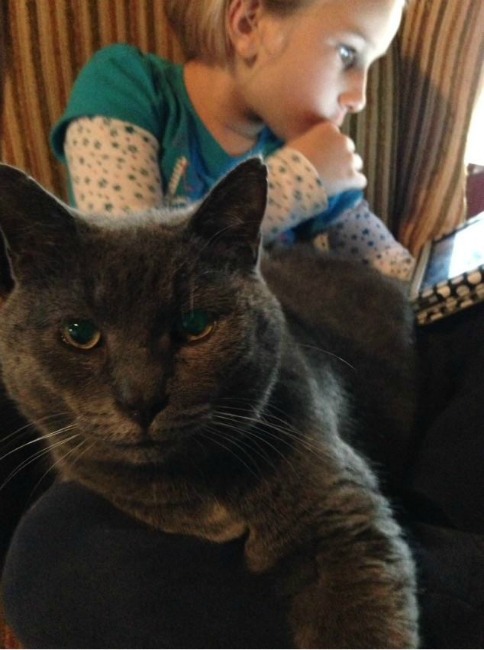
What does a typical day or week look like in your homeschool?
Since I am a public school teacher, much of our schoolwork is on weekends and in the summer, with some evenings crammed in where we can. On Mondays the kids get a work list to do with Granny. Tuesdays and Thursdays they’re at Wind Dance Farm with a group of about 10 other elementary- and middle-school aged kids studying all kinds of cool things – primarily history and ecology. Wednesdays they go to daddy’s work. Fridays daddy is home with them, and they do another mama-made work list. My daughter is using the winter journal from Sarah Janisse Brown right now, because dad works crazy winter hours and I am swamped! I try very hard to read for a while at bedtime. Sometimes Dear America or American Girl or, if my son is picking, Geronimo Stilton. Right now we’re reading the junior novelization of The Omnivore’s Dilemma. My daughter is intrigued with learning where grocery store food comes from.
At home the kids participate in most of the things the adults have to do. This is a big deal for them. They help with the animals and in the garden, plan and help with groceries and errands, they repair things and build things, and right now they’re helping us figure out where to put the yurt we’ll be setting up this spring.
We live far from everything so we spend a lot of time in the car. We listen to all kinds of audiobooks. The best ones lately have been A Long Way From Chicago, stories about the Depression-era American Girl Kit, and Sign of the Beaver. It’s remarkable how much we have to talk about from those stories, and how easy it is to connect other things we encounter in the world to a story we’ve listened to. Plus it spares me from listening to Taylor Swift over and over and over.
What curriculum has worked in your homeschool?
We haven’t used a homeschool curriculum. My son is in cyberschool and they use a lot of Pearson materials, which I don’t like very much. He wanted to try cyber for a year – he’s anxious for the year to end! We have used some Life of Fred to get over math drama (that I guarantee is a result of crazy common core math from when my daughter did cyber in 2nd grade). We patch together math workbooks, and use math games as often as possible so math doesn’t feel like math. We borrowed a science book from the local school because she wanted to try it, but it’s designed to be so flashy that it’s a distraction. The science book she really loves was a throw-away from someone else – it’s about 30 years old. She loves to look at things like diagrams of cells. Those don’t change, and the older books are so much less glamorous and much easier to enjoy! We use all kinds of library books and an atlas for social studies – this year we’re doing world geography. The kids love to cook things from other cultures. Both of my kids attended a Montessori preschool and have a great interest in learning about the world. I try to incorporate writing into all things we do. We loosely use workbooks for spelling/vocab/grammar, but usually we just talk about those things as we see them in books or in the world.
Do you have any favorite homeschooling books?
I love Sarah Janisse Brown’s journals. They’re not books for me to read- they’re for my daughter on days when she can document whatever she’s into at the moment. They’re beautiful and friendly in appearance, which goes a long way for a 9 year old girl who claims she hates to write. Honestly since I’m also a teacher of students with learning disabilities, I’m drawn to books about differentiating instruction and catering to multiple intelligences. I love getting ideas for foldables, graphic organizers, and projects, or creative ways to teach previously boring things. Anne Beninghof is my current favorite. I was lucky enough to see her present some strategies last month, and she’s given me a lot of ideas to use both at home and at work.
Do you tweak curriculum to work for you? Describe how you do that.
We aren’t married to a certain curriculum, and I’m so thankful. We tweak everything to work for us – library books, NPR reports, newspapers, videos, trips to places to learn about stuff. One of our kids’ favorite trips last year was to a factory that bakes rolls that they love. It was close to home, and they got to eat fresh rolls
Anything else you would like to share:
I have found that old library reference books are a steal on Amazon. The library won’t let you check out reference books, but old ones are everywhere and are dirt cheap!
I read some great advice on an old friend’s blog and I’ve found that it’s a huge boost to our sanity. She takes a Sabbath-style break from schooling periodically. The idea of resting on the seventh week actually works out very well if you break down a calendar according to the school year (which is how our evaluations run). We change up the breaks for Thanksgiving/Christmas a little, and we do a good bit more in the week after Christmas because I’m off from my job, but otherwise I try really hard to use her Sabbath strategy. It gives us a low-key week to look forward to, and it lets me break up my year’s parts nicely.
At the beginning of the year I map out about 10 months with my daughter to try to cover all of the things she wants to (and some of the things I feel like we need to… ugh, multiplication tables) – for example, we broke up the year into continents. I just use a one-page calendar to draft our plan, which is not too detailed so we have room to add/modify as we want. We used the time between Thanksgiving and Christmas to do Antarctica, and saved the tougher ones for longer chunks of time. We will do two 3-week chunks in the spring as the end of my public school year and gets to peak craziness (I coach a high school spring sport too) – one will be for Australia and the other for Pennsylvania history.
I love teaching in public school and I try very hard to individualize things for my students as much as I do at home. I teach in a small and student-focused county in WV, but we live in PA – a whole different teaching landscape. It can get tricky to try to explain how a public school teacher can homeschool her own kids. I just know my kids, and I know that they’re doing what’s best for them at this point in their little lives. I believe the high school I work in is a fantastic environment with a good mix of high expectations and opportunities, and I’d be happy if my own kids want to go there when they get older- but I’d also be happy if they wanted to keep working at home. I feel like I’m unusually lucky to have schoolteacher experience and homeschool mama experience (even though it’s exhausting); I hope I am able to use the two roles in a positive and complimentary way so my kids at school and my kids at home can both benefit.
